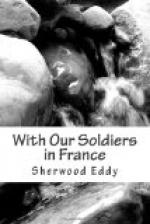The war has been a great revelation of things both good and bad. In the light of this terrible conflict, we may well ask what it shows us of the present virtues and vices of the men, and of our past failure or success in dealing with them, and to what future course of action it should summon us? In other words, what lessons has the war to teach us? Large numbers of young clergymen and laymen of the churches of England and Scotland have gone to the war zone with the men as chaplains, Y M C A workers, or in the army itself, and have learned to know men as they never knew them before. We would covet this opportunity for every young minister or Christian worker in America. Mr. Moody once stated that the Civil War was his university. It was there he learned to understand the human heart and to know and win men.
During the summer of 1917 a questionnaire was sent out to representative religious workers throughout the armies in France and Great Britain by a committee under the chairmanship of the Bishop of Winchester and Professor D. S. Cairns, with Mr. E. C. Carter of the Y M C A, and the Rev. Tissington Tatlow of the Student Christian Movement, as secretaries. Although the results and findings of this committee are not yet published, the writer has before him the reports of numbers of workers in France. In the base camp where he was last working, the questions were taken up by more than a hundred of the workers and discussed in conferences with groups of the soldiers and officers of the various regiments. These were summarized in findings and the reports were compared with the returns made from other centers. The writer has had the privilege of talking with hundreds of the soldiers regarding their own religious lives and difficulties. In this chapter he will try to form a composite photograph of all these impressions and to state impartially the results of his own experience and those of others.
We shall confine ourselves to three outstanding questions: I. What are the moral standards and actions of the men in war time? II. What is their attitude to religion and what is their religious life at the front? III. What is their attitude to the churches, and what lessons may the Church learn from the men at the front?
The questionnaire has been answered mainly by men of the British army, but the writer could observe no radical difference between the British and American forces as regards their religious life. As in other things connected with the war, we in America may learn much from the experience of Britain and other nations.
I
What are the moral standards and actions of the men in war time? At the very beginning, we must recognize the difficulty and danger of generalizations. No two men in the army are precisely alike. All sweeping generalizations are likely to be misleading. Regiments differ from one another and workers receive differing impressions of the front. Most of all we must distinguish between the different classes in the army.




